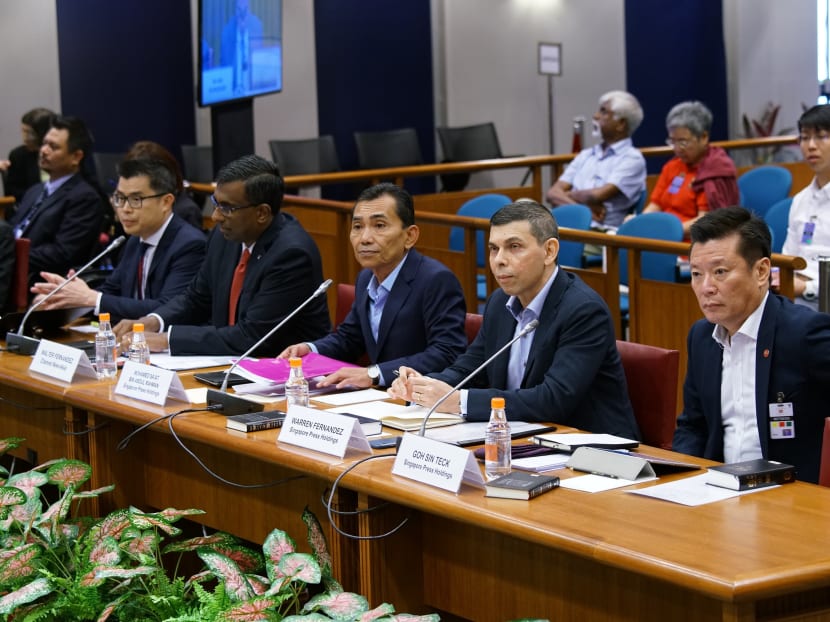Mediacorp, SPH editors voice support for regulation of social media, mobile platforms
SINGAPORE — Top editors of the Republic’s main media outlets voiced support on Friday (March 23) for regulation of major mobile and social media platforms like Facebook, calling for a “level playing field” in terms of taking responsibility for the distribution of online content.

Top editors of the Republic's main media outlets voiced support on Friday (March 23) for regulation of major mobile and social media platforms like Facebook, calling for a "level playing field" in terms of taking responsibility for the distribution of online content. Photo: MCI
SINGAPORE — Top editors of the Republic's main media outlets voiced support on Friday (March 23) for regulation of major mobile and social media platforms like Facebook, calling for a "level playing field" in terms of taking responsibility for the distribution of online content.
Speaking at a public hearing before the Select Committee studying online falsehoods, the editors, however, cautioned against overly broad new legislation against acts such as hate speech and defamation, which should be dealt with under existing laws.
"There should be thresholds with a combination of metrics to determine reach and frequency to decide what a deliberate online falsehood is, and whether and how to address it," Mr Walter Fernandez, Mediacorp's editor-in-chief, said in the broadcaster's written submission to the committee.
He added: "Where necessary, other areas of so-called 'fake news' which may not meet such thresholds in specific instances, for example, hate-speech and defamation, can and should be dealt with under existing legislation and policy. Where gaps exist that such legislation cannot sufficiently deal with specific instances of deliberate online falsehoods, the select committee should identify these gaps, and explain why existing tools are inadequate."
Echoing similar comments in its separate written submission, editors of Singapore Press Holdings (SPH) argued that any new or amended legislation should focus on distribution platforms which are relatively unregulated, such as social media and messaging applications like WhatsApp and Telegram.
"Legislation that restricts the investigative and reporting power of the media would hit the wrong target, as newsrooms already have rigorous and effective mechanisms to check and counter falsehoods. It might also inadvertently curb the media’s ability to fulfil its critical role in informing society, or to remain credible in the eyes of its readers," added SPH.
Their comments came a day after the select committee grilled several representatives from Facebook and other global technology firms like Google and Twitter on their roles and responsibilities in this area. Law and Home Affairs Minister K Shanmugam, for instance, questioned at length Facebook’s actions over a major data breach involving political data firm Cambridge Analytica, and later criticised the social media giant's behaviour as “inexplicable” and “inexcusable”.
At Friday's hearing, select committee member and Nominated Member of Parliament Chia Yong Yong asked the editors whether their call for regulating the online platforms was borne out of self-interest, and "to get rid of people who provide alternative channels for freedom of expression".
In response, SPH's editor-in-chief Warren Fernandez said: "We’re are asking for a more level playing field, we’re not asking you to tip the playing field in our favour."
Adding that the discussion on regulating major online platforms is long overdue, Mr Walter Fernandez of Mediacorp argued that the global technology companies that own Facebook or Twitter have the engineering strength to tackle the problem of online falsehoods if they put their mind to it.
He added: "I think they need to move beyond just peddling mere social interactions and relationships with advertisers, and they have to take responsibility for the public outcomes of what their platforms will do. I think that’s where the legislation we’re speaking to comes from."
The two editors are not related.
While many of the questions on Friday morning continued to focus on the role and conduct of foreign technology companies, select committee member and Jurong GRC MP Ms Rahayu Mahzam also raised questions about the way local newsrooms managed the distribution of information to the public. She asked Mr Mohd Saat Abdul Rahman, the editor of Malay daily Berita Harian, about the type of checks they had in place, and whether this would result in self-censorship.
In response, Mr Warren Fernandez said: "I think you need to make an important distinction between the exercising of judgement by editors and self-censorship. Before we publish anything, we would want to assure ourselves that the content we are putting out is not unfair, and it’s not biased.
"And that process of making that judgement, I don’t think it’s censorship. It’s us exercising responsibility ... We take constant feedback from many sources, from newsmakers, from readers, from organisations to help us inform those judgements. I think that is the critical role that responsible media organisations would play."
Both Mediacorp and SPH also called for the establishment of a "fact checking" body that can deal with deliberate online falsehoods in an independent and transparent manner. For instance, this group, which may consist of representatives from academia, the legal community and civil society groups, could be given the mandate to identify the falsehoods and recommend appropriate remedial actions.
Similar outfits have already been established in Australia, Europe and Japan.
Mediacorp, however, suggested that this "fact checking" outfit should not include representatives from the mainstream media, adding: "It is important that in conducting its work, the fact checking body must also be able to independently assess news and information, including that which is published by the mainstream media.
"The body should be appointed by and accountable to Parliament."






